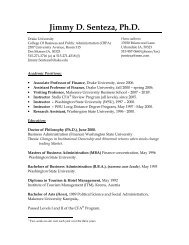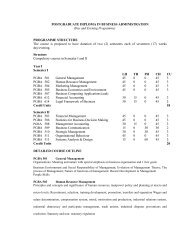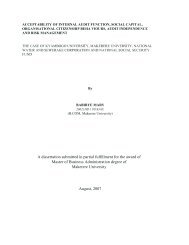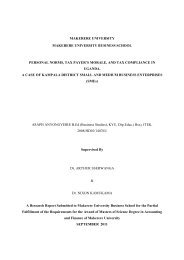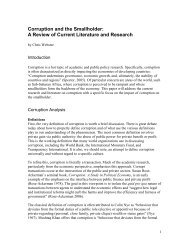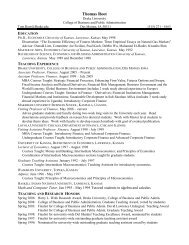13th Annual International Management Conference Proceeding
13th Annual International Management Conference Proceeding
13th Annual International Management Conference Proceeding
You also want an ePaper? Increase the reach of your titles
YUMPU automatically turns print PDFs into web optimized ePapers that Google loves.
ecognize and nourish their capabilities (Khanka, 2004). In Kenya, entrepreneurial attributes are nurtured in<br />
different institutions. KIA offers training, research and consultancy services to improve its clientele’s<br />
performance. The Institute can develop other demand-driven programmes around some of these attributes.<br />
1.1.3 Entrepreneurship Development in the World<br />
The extent of development of enterprise culture varies with countries due to challenges and strategies<br />
experienced. In Europe, the Lisbon European Council of March 2000 set for the European Union the strategic<br />
objective of becoming the most competitive and dynamic knowledge economy in the world by promoting<br />
entrepreneurship among other initiatives (Hull, 2003). The Commission analyses and studies how to<br />
ameliorate the overall environment that enterprises have to operate in.<br />
In 1994 Belgium introduced in Wallonia, the "Enterprise discovery open days" event for the public to have<br />
the opportunity to discover the business world over one weekend. This raises the profile of entrepreneurs,<br />
reveals the value of their work and improves integration in the region networking.<br />
Greece encourages self-employment and provides the knowledge required for the undertaking of<br />
entrepreneurial initiatives. The current network of entrepreneurship centres for young people enables them to<br />
search for the information needed to set up their own business or to co-operate with their peers in a productive<br />
environment. This fits in the Gibb’s enterprise culture framework used in this study. In Poland, the most<br />
important and prestigious awards given to entrepreneurs are the President of the Republic Business Awards,<br />
also called the Business "Nobel" as strategies to encourage entrepreneurship.<br />
Britain launched the Enterprise Insight in May 2000 to bring about a substantial increase in proentrepreneurial<br />
attitudes. Today, UK has 3.4m self-employed people. Entrepreneurship as a career choice is<br />
becoming more attractive using realistic role models; and images that portray a holistic view of what it means<br />
to be entrepreneurial. All these factors require individuals, in businesses, to spot opportunities, take initiatives<br />
and adapt to changing circumstances. Many institutions are set to develop entrepreneurship. Entrepreneurship<br />
needs to be seen as a positive and worthwhile activity, so that those who are attracted to it are supported and<br />
encouraged. But, fewer people in the UK think being an entrepreneur is a good career choice in Kenya than in<br />
the US.<br />
Lack of poorly developed entrepreneurial capacity in Africa is one of the main factors contributing towards the<br />
continent’s poor socio-economic performance. Africa has the highest rate of entrepreneurial development but<br />
also highest rates of poverty and unemployment. In response, many African governments have been<br />
implementing entrepreneurship policies and programmes aimed to develop entrepreneurial capacity with<br />
moderate success. The economies of Southern Africa are characterized by large informal sectors Botswana has<br />
a relatively better enterprise culture due to good macro-economic policies and governance among others factors<br />
(Themba, 2006). But most of these countries have weak enterprise cultures.<br />
Eastern Africa countries have weak enterprise cultures. For example, in Uganda, enterprises are one of the key<br />
engines of growth (Balunywa, 2004). The country is however faced by high rate of business failure mainly due<br />
to poor management. This affects the sustainability of enterprise culture. The country mainly relies on<br />
necessity (basic) entrepreneurship, which may imply weak enterprise culture. Balunywa further raises the<br />
concern for differences in success between the Asian and African business people and concludes that Asians<br />
have low uncertainty avoidance among other reasons, which is high for Africans (Hofstede, 1980).<br />
1.1.4 Entrepreneurship in Kenya<br />
For rapid economic development, a “country requires a strategic approach to developing its entrepreneurs and<br />
enterprises” (Mullei and Bokea, 1999). Entrepreneurial approach harnesses a tremendous amount of human<br />
resource capabilities for faster economic growth. In Kenya the debate on enterprise culture development is old<br />
and still ranging on. The emotion of Enterprise culture to produce a critical mass of creative and innovative<br />
Kenyans capable of developing into a profile of entrepreneurs, especially among the youth (who are the<br />
majority of the population), trainers and policy makers is attempted by many players where KIA plays a critical<br />
role.<br />
19




